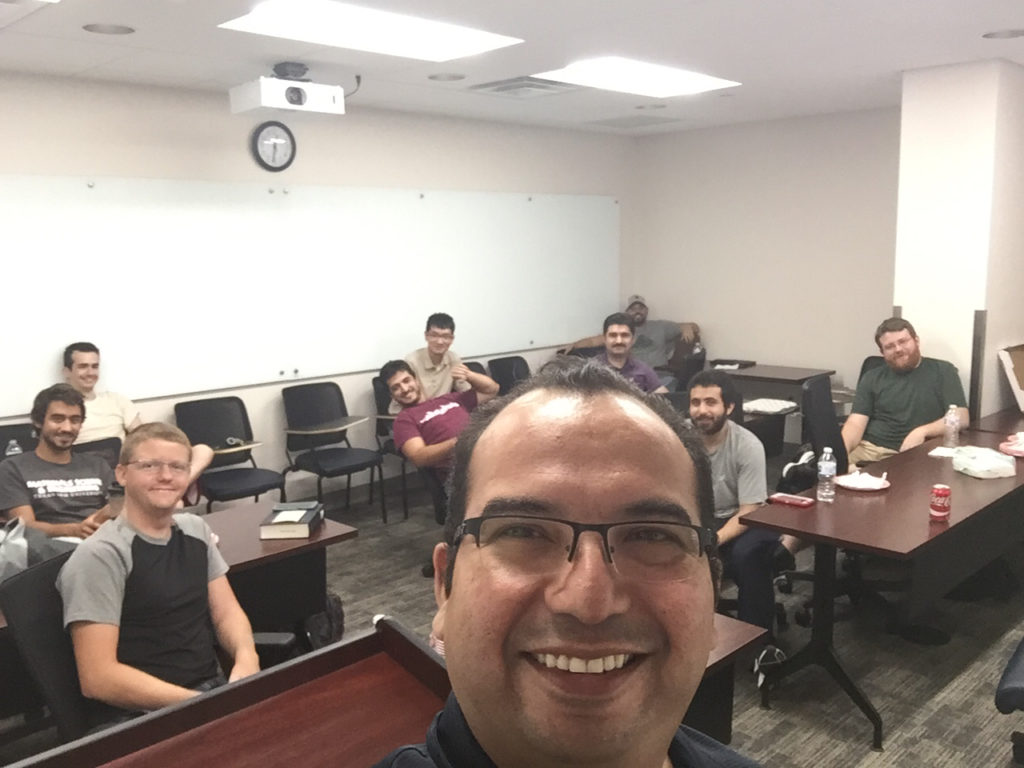Currently an undergraduate Mechanical Engineering senior at Texas A&M. I am working on using a continuous constraint satisfaction algorithm (provided by Dr. Richard Malak’s group) to search high-entropy alloy space and feasible liquid metal dealloying systems. Previously, I collected data points of different austenitic steel compositions and their stacking fault energy (SFE) as well as collecting data points for the SFE of magnesium alloys.
ANAS graduated and started his graduate studies @ Berkeley. Congratulation Anas… [Summer 2017]

Amir Behbahanian
Richard Couperthwaite
I started as a Ph.D. Student with Dr. Arroyave’s Group in Fall 2017, and have been working on the computational design of steel materials using thermodynamics and information-fusion techniques. Side projects have extended into the use of machine learning techniques for quantification of microstructures.
Before Starting my Ph.D. I worked in materials research and development at Mintek in South Africa. Some of my focus areas while working there was the development of more corrosion and oxidation resistant FeAl alloys, colored gold and platinum jewelry alloys and metal spray forming.
Thien Duong
About me:
I’m currently a PhD candidate in Mechanical Engineering at Texas A&M University. I acquired my BS degree in Mechatronics at the University of Technology – Ho Chi Minh City, Vietnam in 2007. Later, I was pursuing M.S. in Control and System at Texas A&M University, a university of traditions and honors to me, starting in Fall 2008. During my MS career, I realized my passion for Materials Science, particularly Computational Materials Science and Engineering; I decided to change my major for PhD career at the same beloved school in Spring 2011. I find that this decision is a great turn in my life, in which I’m passionately enjoying my work, researches, studies and above all my life as a materials scientist.
Supriyo Ghosh
Sean Gibbons
Interests: The application of computational methods to evaluate complex data sets for simulation initialization and to develop holistic materials science and engineering focused models; use atomistic scale information to tailor continuum level phase-field-models to timely and accurately simulate microstructural evolution for a given system, that can in-turn be used to drive experimental research and process and design cycles.
Pejman Honarmandi
Post-doctoral researcher
Arroyave Research Group, Texas A&M U.
Office: Doherty Bldg., A301
Phone:
E-Mail: hona107@tamu.edu
I am from Iran and currently a post-doctoral researcher of Materials Science & Engineering at Texas A&M University. I received a bachelor’s degree from Sharif University of Technology (SUT), and subsequently a master’s degree from Khaje Nasir Toosi University of Technology (KNTU). I am proud to declare that I was recognized as a top graduate student among the graduates of academic year of 2008-2009, and honored for obtaining the highest total GPA.
Because of my intense enthusiasm for investigating in different fields of materials science, I did various experimental and theoretical research during my past education, including “assessment of surface resistance in polymeric nano-composite materials”, “evaluation of hot deformation behavior in steels and titanium alloys, “synthesis, characterization, and microscopic analysis of different types of nano-materials”, etc, which led to the publication of different ISI and conference papers.
I joined Prof. Arroyave’s group in Fall 2014, and my research field of interest is alloy design under uncertainty, including modeling and Bayesian uncertainty analysis of plastic flow behavior of low-alloy TRIP-assisted steels, and precipitation kinetics of NiTi based shape memory alloys.
Jaylen James
Graduate Research Assistant
Arroyave Research Group, Texas A&M U.
Office: Doherty Bldg., A301
Phone:
E-Mail: jaylen_james@tamu.edu
Jaylen James graduated from Priarie View A&M University with a Bachelors degree in Mechanical Engineering. He is now pursuing his PhD. Currently, his research focus is in fusing information from multi-fidelity sources using model reification. This project is in collaboration with the Air Force Research Laboratory. The methods Jaylen is working on will help researchers better predict material properties and help enhance the material design process for various applications.
Tanner Kirk
Graduate Research Assistant
Design Systems Laboratory, Texas A&M
Office: Doherty Bldg., 309
Email: tannerkirk@tamu.edu
Tanner Kirk is a Ph.D. student in the Mechanical Engineering Department at Texas A&M University. He is co-advised by Dr. Richard Malak and Dr. Raymundo Arroyave. Tanner researches the use of robotic path planning algorithms to design Functionally Graded Materials (FGMs). The methods Tanner develops use thermodynamic predictions of phase formation (CALPHAD) to plan FGMs that avoid the deleterious phases that often plague the manufacturing of FGMs. These methods are scalable to FGMs composed of an arbitrary number of elements and can be used to optimize FGMs for performance. Tanner’s other research interests are machine learning, optimization, and materials design.
Dehao Liu
Post-doctoral researcher
Arroyave Research Group, Texas A&M U.
Office: Doherty Bldg., A301
Phone:
E-Mail: dehao.liu@tamu.edu
Dehao Liu is currently a postdoctoral researcher in the Department of Materials Science & Engineering and Texas A&M Institute of Data Science at Texas A&M University. He is co-advised by Dr. Raymundo Arroyave from Materials Science & Engineering and Dr. Ulisses Braga-Neto from Electrical & Computer Engineering. He received his BS in mechanical engineering from Tsinghua University in 2016 and PhD in mechanical engineering from Georgia Institute of Technology in 2021. His research focuses on constructing comprehensive and robust process-structure-property relationships for systematic process and materials design for advanced manufacturing by combining multiscale multiphysics simulation, physics-constrained machine learning, and scalable versatile Bayesian optimization.
